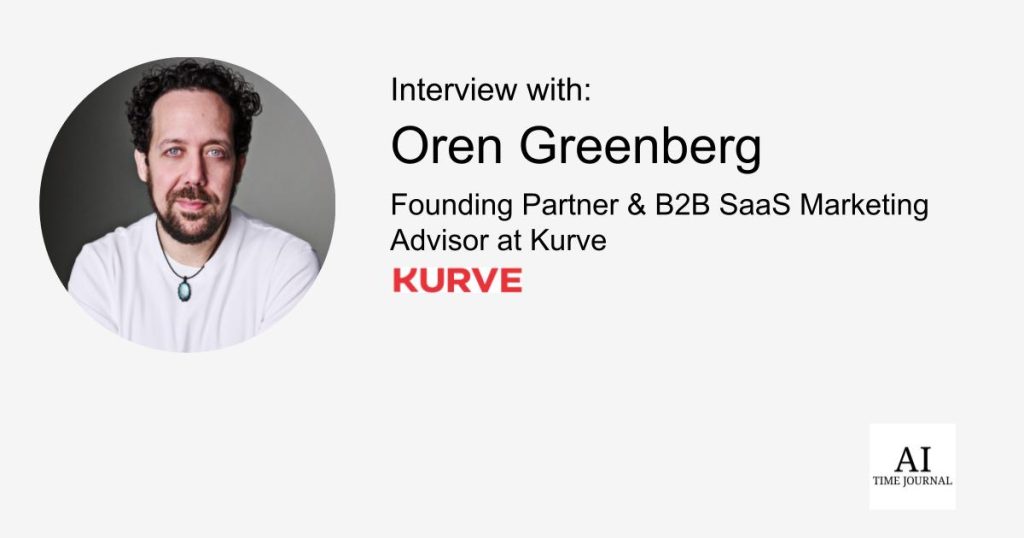
Oren Greenberg, founder of Kurve, is a seasoned marketing expert with over 20 years of experience helping SaaS businesses overcome challenges like flat messaging, low conversion rates, and intense competition. As a fractional CMO, he specializes in turning marketing chaos into strategic success, achieving remarkable results such as a 273% increase in conversions and a 10X growth in client lists through a scientific, data-driven approach. Oren is passionate about the impact of AI and automation on business, the future of work, and career advice, and he is eager to share his insights on leadership within the context of marketing. His innovative strategies and pivotal moments, like achieving 500 daily enquiries for a client by refining their marketing strategy, showcase his expertise and relentless drive for sustainable growth.
Can you share a pivotal moment in your career that significantly shaped your approach to marketing for SaaS businesses?
I had a moment with a client where I took them from 0 to 500 enquiries a day almost overnight (it actually took 2.5 months) by changing the channel-audience fit in part of the marketing strategy. It took me a good 15 years of experience to get to that point – so the reality is any given moment in time is really just a revelation that’s an accumulation of historical momentum.
What are the most common mistakes you see SaaS companies making in their marketing strategies, and how can they avoid them?
Buying excessively expensive martech or over-investing in infrastructure for predicted scale that never materializes.
Instead of preparing for scale, validating and buying solutions that scale over time through usage-based pricing. Staggering stages rather than going all in.
Spending excessively on the wrong channels like TV ads for a niche product, burning 10s of millions.
Validate spend on a channel and measuring performance with the minimum required before going all-in.
Bringing in the wrong marketing talent which takes them in the entirely wrong direction.
Hiring impartial marketing experts/advisors to help validate the right hires.
How has the role of AI and automation evolved in marketing, and what do you foresee as the next big shift in this area?
AI is different than automation.
In terms of automation it’s evolved from automated email sequences to hyper-personalized messaging based on behavior or segmentation (e.g. demographics, psychographics, technographics).
Can you describe a time when a data-driven approach to marketing led to an unexpected breakthrough for a client?
I’ve seen breakthroughs happen with either qualitative or quantitative data. The insight derived from the analysis leads to a hypothesis that, when tested, resulted in meaningful uplift. The simplest example to make this easy to understand is that we ran a sample size test changing the call-to-action button color on the homepage for a website with over 5million unique visits a month. Simply by changing blue to red for greater contrast we saw an $800k annual incremental revenue uplift.
What leadership qualities do you believe are essential for a fractional CMO to successfully guide a company through a marketing transformation?
The 3 most important qualities:
- Driving the marketing strategy
- Driving assembly & management of the right team talent
- Tying in marketing KPIs into commercial KPIs
How do you balance creativity and analytics in your marketing strategies to ensure both innovation and measurable success?
I drift towards the innovation side naturally; I’m constantly disrupting to find a better way to do things. The analytics side is best handled by bringing in data experts, be that Google Analytics, Hubspot or Amplitude.
What advice would you give to aspiring marketers looking to specialize in the SaaS industry?
Get a job in a SaaS company. Follow SaaS CEOs & marketing leaders.
Can you discuss a challenging project where you had to pivot your strategy mid-course and the lessons learned from that experience?
I often have to pivot my strategy across clients. It’s typical that reality is different than assumption. The most challenging project I can think of is when a company shifted from a consumer to a business target audience. Resulting in having to change the tech stack, team skills, messaging, positioning, design, and creative assets. It’s essentially starting everything from scratch as if it’s a new business, all previous work went down the drain.
In your experience, how can SaaS companies best leverage customer feedback to refine their marketing efforts?
Qualitative interviews with customers. Surveys also are conducted on a broad group that doesn’t necessarily have the ideal customer profile within existing segments. In-product surveys. The key is to nail positioning (category differentiation) while also understanding the customer’s jobs to be done.
Looking ahead, what do you believe will be the most significant trends in marketing for SaaS businesses over the next five years?
AI mostly, particularly natural language processing and image related engines. Automation & personalization at scale. This will also impact outbound sales for low and mid ticket SaaS businesses as we’re already seeing.

 5 months ago
58
5 months ago
58







 English (US) ·
English (US) ·